—The Editors
1. Gan Yaoming (Taiwan) – History As Fairytale
by Zhu Youxun (trans. Poppy Toland)

Photo by Shen Huifeng
In 2009, when Gan Yaoming's book Killing Ghost was dazzling Taiwan's book market, a friend of mine described it as Hayao Miyazaki in book form. This seemed counterintuitive, as Gan's novels differ from Miyazaki's mangas not only thematically and stylistically but in their narratives as well. Yet the analogy holds water in at least one important respect: both oeuvres invoke fairytales at the same time as they engage deeply with history.
Early on in his literary career, Gan Yaoming already abandoned the tired and uninspired first-person internal monologues so widely used by young fiction writers. Instead, he engaged a fantastic, fairytale logic in depicting a fictional universe that is stylistically his own. Unlike other fiction writers, he does not subscribe to the modern mantra that simple and clearly defined characters should be avoided. On the contrary, Gan Yaoming seems to believe that simple characters do not harm the novel, only boring characters do. And Gan Yaoming's work is in no way boring; it is simply by way of clear-cut characterizations that his rich stories unfold.
Gan's most representative work Killing Ghost shows a clearly talented novelist at the height of his powers. This is a historical novel—although the vast majority of its readers would probably be surprised to hear it described as such.
In contrast with Li Qiao's Wintery Night trilogy, which also tackles the subject of WWII Japanese occupation but uses realist techniques, Killing Ghost appears, on the surface at least, to take 'unrealism' to its limits. This is evident from its opening scene, in which the protagonist, Pa, fights a resistance battle against trains representing the Japanese. Fantastical twists throughout keep the reader racing through the carefully constructed curves of the plot, never losing speed.
Wide-eyed readers are also sure to feel compassion and sorrow for the victims of history in this novel—testament to Gan's skill as a writer. One scene that comes to mind is when Liu Jinfu poisons Pa to save him from being conscripted into military service. Depictions of bitter struggles such as this are written with great attention and act as a profound metaphor for the colonial situation. Gan's latest work Tales at the Funeral opens with a fairytale which evolves into other stories of great compassion—again, with a clear basis in history.
Despite the flashiness of some of his techniques, it is clear that Gan has nothing but empathy for his characters. His writing is innovative while at the same time reminding us that we still have much to learn from the past. Historical writing does not necessarily have to be weighty to fulfil literature's goals, whether exploratory or ethical. And just because a literary work is profound does not mean it cannot also be enjoyable—as the above examples show. Gan's fiction bridges genres previously thought irreconcilable—but "achieving the impossible"—isn't that what fairytales do?
Gan Yaoming's Bio:
Born in 1972, Gan Yaoming started to write fiction at the Chinese Department of Tunghai University. Part of a literary circle '8P', whose members all won literary awards. After Waterghost School and Losing Mama′s Otter, Gan Yaoming developed the unique style he is now known for in Killing Ghost and Tales at the Funeral.
Recommended Works:
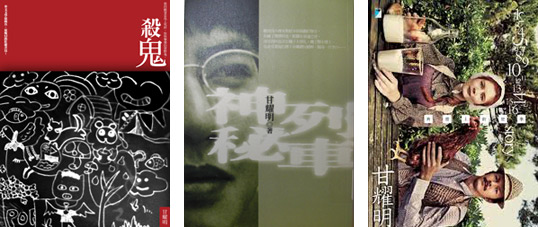
Killing Ghost (2009) A hefty novel of great craft, easy to get lost in, with its staggering cast of characters and complex plot. Nonetheless, this won't matter—you'll be gripped from start to finish.
Mysterious Train (2003) As Li Shuangxue has commented, the short stories in this collection almost seem to have been written by different writers. The range of voices, themes and styles found in this collection hints at the writer's full potential. Readers who are only familiar with his later work might revisit this collection for his earlier styles and imagine parallel Gan Yaoming universes.
Tales at the Funeral (2010) This short-story collection uses a typically classical framework, where each person tells a different story, similar to 1,001 Nights or Canterbury Tales. Each story employs a traditional structure, unlike so many contemporary narratives these days.
2. Wang Congwei (Taiwan) – Freewheeling From Here to There
by Ding Yungong (trans. Poppy Toland)

Photo by He Shang
I have an image of Wang Congwei at the editorial office of FHM. Following an introduction by the novelist Xu Rongzhe, I'd been invited to go and talk to him about writing an article. Before that I'd only ever seen him in the enthralling final to the Newcomers Literary Contest. Having been eliminated from the same contest, I was feeling pretty sour - so I sat opposite, throwing him sideways glances.
Of course I was aware that there was no way a men's magazine was going to commission me to write about Dostoevsky and Khodorkovsky and for this I had prepared myself. But I was still nursing the fantasy that I might be able to write about a fashionable topic like music, film or culture study. However, what he assigned me was a piece entitled 'Top Ten Madnesses in the History of the Congress.'
"Make it farcical," he said. "Next time I'll ask you to write a piece called 'Taiwan in a Thousand Years.'"
"What the hell are you talking about?" I wanted to shout.
*
I have another image of Wang, many years later, at Kaohsiung's Literary Prize Award Ceremony. By then he was Editor-in-Chief of Unitas Magazine, the organiser of the event. With his arms crossed, he leisurely surveyed the running of the ceremony. I was there in the vulgar and uncultured role of city official. All I could do was stand there holding a slice of cake from the after-ceremony garden party while searching for people to engage in uneasy small-talk.
I'd just finished a close reading of Complicated Island and Riverside Girl. So, I asked Wang, "Your next work, will it also be set in Kaohsiung?" It felt like the appropriate question to ask then.
"No plans like that at the moment," he responded. "My next novel will be a romance."
"A what?" I asked
"A romance," he repeated.
"Well..." (I was rather out of my depth.)
*
A further image of Wang, at yet another literary prize award ceremony. Again, he was there in his capacity of Editor-in-Chief of Unitas Magazine, and again I had turned into a socially awkward and dull conversationalist.
"Actually I haven't really been awarded three major newspaper's literary prizes," he told me.
"What? Really? Never?" I was seriously shocked, although naturally I didn't let it show in my face.
"Really. Maybe one day I'll have a go and see if I can," he said, his tone of voice clearly implying that he was joking.
*
I first became aware of Wang Congwei in 2004, and as someone who did not pay much attention to the dynamics of the literary world, this shows that he was already a well known figure, at least within highbrow circles.
Had he really never had to play the kinds of games we were all forced to play? The last few generations of literary writers have almost without exception had to rely on literary prizes to get noticed—and see them as more important than getting published. Because of this, the elected literary elite seem to have the same "prize-winning" style. This is more about knowing what one shouldn't write rather than what one should. Murakami-esque youth fiction and Internet love stories, for example, are taboo.
One would be hard-pressed to argue against such restrictions, but it is hard to deny the limits they place on writing. The situation is akin to being trapped in a cage. Wang, however, has not been entrapped – perhaps because from early on he refused to enter the cage. In fact, the philosophy graduate even writes in a plain style, out of an unwillingness to adopt the pretentions of highbrow literature.
The best writer to come out of Kaohsiung in a decade, Wang first won acclaim for neo-nativist novels Complicated Island and Riverside Girl. Who could have predicted that the excellent prose stylist would follow up with Lovers Have Passed By, a book printed to look like an internet novel with celebrity recommendations on the cover, and of course this year's scandalous Teacher's Body?
Wang's trajectory makes me think of a sidecar. I'm not even sure he has the kind of money for a sidecar, but it appears to have become a signature of his. Defying all expectation with each new book, he seems to be saying, "Hey, look — I can ride directly from here to there. Can you?"
The sidecar doesn't have four wheels, nor does it have two wheels. Everyone knows what it is, but you don't often see it on the road. It can cross Complicated Island with its deliberately literary intentions, but it can also carry lovers who are absurdly light. In his quest for freedom in writing, Wang does not travel in any one single direction but he can only ever go forwards.
Wang Congwei's Bio:
Wang Congwei was born in 1972. He studied at the National Taiwan University's Department of Philosophy and Graduate Institute of Art History. Previously an Assistant Editor at Taiwan Ming Pao Weekly, an Assistant Executive Editor-in-Chief at Marie Claire and an Assistant Editor-in-chief of FHM, Wang is currently Editor-in-Chief at Unitas Magazine.
He started receiving the attention of the literary world in 1999, immediately after "Shanoon Ocean Journey" was selected for the 1998 Short Story Awards. In 2008 his full-length novel, Riverside Girl, won the China Times Book Review's Ten Best Books Award and the Wu Yongfu Literary Award; it was also nominated for the Jin Ding Award and the Taiwan Golden Classic Literature Prize and was among the books selected for the Frankfurt Book Fair. That same year his collection of novellas and short stories Complicated Island was published to great acclaim, and selected as a finalist for the Taipei International Book Fair Prize. Other works include Teacher's Body, Lovers Have Passed By, Fleeting Images, Walking Zhongshan North Road and Taipei Is Not Around To Prove It.
Recommended Works:
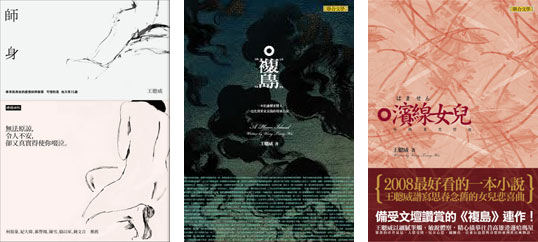
Teacher's Body (2012) Centering on the controversial issue of teacher-student relationships, this novel reminds us that behind every report you read in a newspaper is a heap of suppressed personal accounts. Oh, and hell is other people.
Complicated Island (2008) An island within an island—thus "Complicated Island." It's not the Qijin everyone knows, teeming with seafood restaurants and seawater bathing pools, but a Qijin of family memories mixed with illusions. Via these four stand-alone short stories linked by characters from one paternal lineage, Wang transports you through harbour tunnels into whirlpool narratives.
Riverside Girl (2008) You might not know that the place name, Hamasing, actually comes from the Japanese pronunciation for riverside. Or that for a hundred years there was a railway line there which passed through its residential courtyards, western-style buildings, palace, brand new department stores—with macabre pasts—towards the dark alleys of its town centre. Wang describes everything prior to Hamasing as floating in the reclaimed land of memory, and doubt.
3. Gao Yifeng (Taiwan) – Freezing Scenes, Going Fast
by Chih-Ying Lay (trans. Jiang Chenxin)

Photo by Zhang Enhao
Going Fast in Bright Light was my introduction to Gao Yifeng's work. This short story collection deals with city life—more usually the subject of movies and photography, as these popular media lend themselves better to capturing bright lights and urban rhythms. Where language is used in these works, it aims for the instant impact of ads. Unusually for a literary writer, Gao is also a fashion magazine editor and hence an arbiter of pop culture trends, so I was intrigued by his choice of the conventional art form of the novel to portray city life. Upon reading his earlier fictions (This Cage Called Home, Scar Preface, Flesh Moth), I discovered the impressive scope of Gao's imagination: his stories are set in places ranging from countryside to city, from office to prison; they are peopled by both blue- and white-collar characters, and draw freely on the Hakka dialect. Furthermore, Gao's understanding of the human condition turns out to be several generations deep.
Gao once asked, "If life were to freeze in an instant, what would it look like?" His stories often depict such frozen scenes, or begin with a frozen point in time and expand outwards from that moment, which thus functions like the vanishing point in a two-dimensional drawing. This narrative strategy, inherently unsuited for the exploration of cause and effect (a story's "third dimension," if you will), appears in a number of Gao's fictions, including "Tiger," "Man-Shaped Cage," "Walkway," and "One Gram of Sadness", the last of which reads like an urban sketch book. Most fully explored in the novel Phantom Asylum, this narrative structure made Tong Weige wonder if it was not essentially an "extended short story." Interestingly, Gao himself has coined the word "micro-novel" to describe what he does. Whether he sets out to write "extended short stories" or "micro-novels," his technique is assuredly cubist: To convey the many elements of Phantom Asylum's plot, he depicts multiple points in time on the same plane. Such a controlled structure erases a sense of passing time, and heightens the artifice of his settings.
The theme of freezing is more than a temporal device in Gao's work, however, as many characters carry scars, frozen reminders of the past. Characters with scars form another hallmark of Gao's fiction, as easy to recognize as a signature, especially in Going Fast in Bright Light.
Though many of Gao's characters are misfits or losers, even if they may have pulled the short straw in life, Gao rarely allows them to die: instead, despite setback after setback, they live on, absorbing more and more pain. They would resemble characters in a Paul Auster novel—except that Gao's characters are yet more resigned, having been abandoned even by death.
Gao is serious about fiction: you can tell that it is his life work. The way he writes is strategic, focused, the result of careful planning, such as the outline for his "City Trilogy." Attracted to—or possibly dragged into—this pursuit, his wife Peng Xinrou has also begun to write novels and plays, and his young son makes a cameo appearance in a novel by the young writer Shen Xiaofeng. Gao's whole family thus appears to have been captured by the pursuit of writing: but if this is their cage, it is the most expansive, least limiting cage there is.
Gao Yifeng's Bio:
Born in 1973 in Miaoli, Gao (also known as Kao Yifeng) studied law at the Chinese Cultural University. He has worked as a bartender, dancer, and playwright, and now edits a fashion magazine. He is married with one son. He has received numerous awards, including the Baodao Literary Prize, the Lin Rung-san Literary Prize, and the China Times Literary Prize. His works include This Cage Called Home, Scar Preface, Flesh Moth, Going Fast in Bright Light, A Gram of Sadness, and the TV-novelization Starry Starry Night.
Recommended Works:
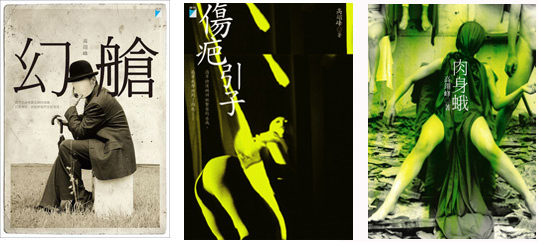
Phantom Asylum (2011) Gao considers this his first novel (although Going Fast in Bright Light is arguably a novel in stories), and the first in a planned trilogy operating with the following constraints: "limited space + unlimited time," "unlimited space + limited time," and "partially limited space + partially limited time." In Phantom Asylum, there is no sense of passing time because all the characters have been sequestered in a place called the Bunker. Dali, the protagonist, misses his wife and children: he lives in an unreal environment controlled by an unknown force. He and the other inhabitants of the Bunker can only wait endlessly for an unknowable future. According to Gao, the Bunker is a projection of the fear and worry he experienced when living in Beijing. Although Phantom Asylum is not an easy read (one of Gao's earlier novels may be a better introduction to his work), it fully demonstrates the maturity of his craft.
"The Story Ah San Tells" from Scar Preface (2005) The theatrical quality or self-awareness of Gao's fiction is usually evident, even in his essays, but "The Story Ah San Tells" is one of the few pieces that truly blurs the line between fiction and drama. The story is a subtle and moving account of a boy from an orphanage, Ah San, and his complex relationship with his foster father. It is a notable instance of Gao's non-urban writing.
"Tiger" from Flesh Moth (2004) This story is about the final days of death row convict Xing Zai, and his executioner, Tiger. The death sentence itself is left unexplained, and we also never learn precisely how severe Tiger's chronic illness is. But the simple affection between the two men is deftly depicted, as is their interaction with the guards. Gao's signature move of freezing time works perfectly in this story, which won him the China Times Literary Prize.
4. Zhang Yixuan (Taiwan) – Intelligence and Precision in Fiction
by Sheng Haowei (trans. Jiang Chenxin)
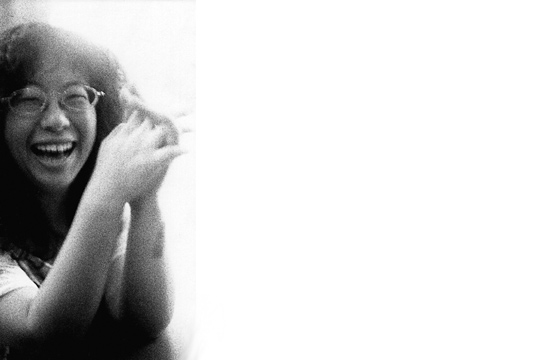
Photo by Guo Yijun
I often catch myself returning to Zhang Yixuan's novels, unable to put them down. Her books are the sort that makes the reader come back again and again for more. Over a sixteen-year career (if one considers winning Unitas's First Book Award to marked its start), Zhang has written only five short stories, two novellas, and one novel. This may not add up to very many words, but it only goes to show that being prolific is no measure of an author's brilliance.
Consider the titles of her books: When Things Decay, The Best of Times, and Not In Love for Long. All three point to time and its corrosive effects. For Zhang, time is not linear: time is intervals, seasons; time itself takes time; it consists of milestones glowing along a vast, misty process. In this spirit, Zhang's stories also do not merely progress towards a clear resolution: the milestones in her stories appear, recede, and connect freely, yet they never seem disordered. The reader does not experience events in sequence or in reverse; you instead watch the author connect the dots until an event can be seen in its entirety, like a constellation. Zhang's work always illuminates aspects of the human condition: fondest memories, being in love, aging. For Zhang, these complex emotional states are her subjects of study. She uses lucid words and precise metaphors to help us understand the emotions her characters experience. Zhang's obvious intelligence in this is both impressive and reassuring. Her narrative posture is such that she neither surveys the fictional world from above nor self-indulgently drowns in it. This, to me, is the perfect distance.
When Zhang announced her arrival on the literary scene with When Things Decay, its portrayal of women (lesbians, especially) was hotly debated. This may have been the case because Zhang tells these tales of passion and youth in a jaded, worldly tone that is astute but a little too deliberately blasé. Yet this flaw all but disappears in her second book, The Best of Times. Its title story portrays a group of lesbian feminists in such delicious detail that it immediately rings true to anyone who has belonged to a feminist group. "In the Dust of Summer," this collection's second—and perhaps even better—story, plays with different points of view without losing its continuity or depth of emotion, and demonstrates Zhang's maturity as an author. As for Not In Love for Long, published last year: I was moved by how funny it was, and bold, and astute, and unpretentious. This book is also marked by its philosophical depth and narrative simplicity. As the author herself says, this is a book that you can "slip into your coat pocket in winter, or take along with your beach towel and sunblock to the seaside in summer." And because the subtlety and perspicacity of a book depends much upon the author, her style is nearly impossible to imitate, and Taiwan cannot hope for another Zhang Yixuan. Readers like me who have been mesmerized by her work can only wait for her next, perhaps even more mesmerizing book.
Zhang Yixuan's Bio:
Born in 1973 in Taipei, Zhang earned a Master's degree from the Department of Cinema and Audiovisual Studies at Paris III Sorbonne Nouvelle. She began to write stories and plays when she was a student at Zhongshan Girls High School. She later studied history at National Chengchi University, where she chaired the Society for Women Studies. In 1996, "Domestic Affairs" was awarded Unitas's New Author Award for Fiction. It won high praise from Li Ang, who sat on the judging panel that year. It was also selected for Avanguard's The Best Taiwanese Literature 1995-1996. Zhang's short story collections When Things Decay and The Best of Times were published by Rye Field in 2001 and 2003 respectively. Following an eight-year silence, her novel Not In Love for Long: Recollections of Nantes and Paris was published in 2011 by Unitas. She is also the author of the essay collections As a Suspected Feminist and The Unlikely Happy Art of Being in Love, as well as the short play Natalie, What are You Doing on this Earth?, among others.
Recommended Works:
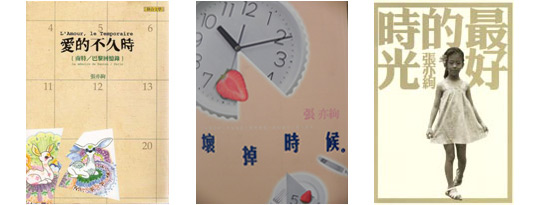
Not In Love for Long: Recollections of Nantes and Paris (2011) How does a collection of memories become a novel? Is it possible for someone from Taiwan to love someone from France? What about a lesbian and a straight man, how can they love each other? This is a novel with many questions (is it a novel?), and a novel that never stops wondering: if love is "not for long," why bother recording it? Do refusing to express love and refusing to come out of the closet both prove the existence of the same thing? This book is hard to categorize but easy to fall in love with.
When Things Decay (2001) This collection includes five stories: "A Clan's Beginnings," "The Happy Haunted House," "A Story of Sex," "The Psychedelic Tablecloth," all about lesbian passion and love, and "Domestic Affairs," about domestic sexual violence. The psychological description in these stories may describe forms of decay, but the reader also powerfully senses that, in Zhang's own words, "when I am not writing stories I start decaying." Writing is a mode of resistance against decay, a way of turning oneself in, a form of salvation.
The Best of Times (2003) This book is about lesbianism and feminism on campus. In its portrayal of the pressures of life and love for a group of women at the university's gender studies department, each character is complex and believable; "In the Dust of Summer" contains a moving description of the relationship between former lovers. The book is ultimately about the process of growing up, which does not entail having to give up on dreams: rather, growing up means being able to turn away from the past, remembering it as "the best of times."
5. Lu Min (China) – Subtle Minutiae
by Zhang Li (trans. Yu Yan Chen)
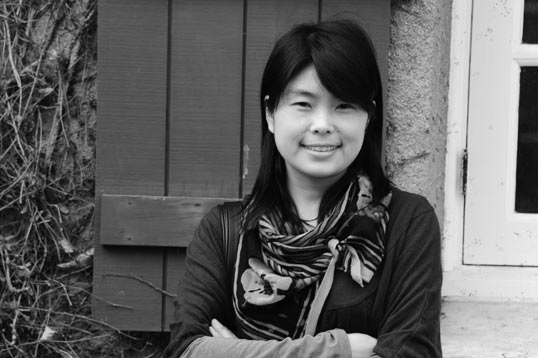
Photo provided by the author
In April 1993, the novelist Su Tong went to the Xinjiekou Post Office in Nanjing to purchase a stamp depicting seniors playing chess and was attended by a young woman. Eighteen years later, this same woman recounted the meeting to Su Tong, now her special guest at the launch of her latest book, saying that though they were complete strangers at the time, she felt the spirit of literature in his presence and was so affected that she thought of resigning immediately to go home and write.
Having worked as a salesperson, clerk, public relations manager, journalist, and secretary, Lu Min's writing interests are broad and complex, the numerous worlds she depicts vast and open. Two settings recur: one is the distant, blurry and mythical rural world of Dongba that appears in No Evil Thought, The Song of Parting, Love Clippings, Page-Drunk, and Swallow's Letter. A fictive homeland reminiscent of the milieux described by Shen Congwen and Wang Zengqi, Dongba stands for simplicity and peace.
The other setting of Lu's stories is the complicated modern city, crowded with the unnoticed lives of postmen, broadcasters, doctors, spinsters, pigeon feeders, and librarians. In rendering these characters' lives, she takes care to detail their tiny but persistent afflictions (skin diseases, nausea, dizzy spells) and neuroses (compulsive lying, voyeurism). These descriptions provide access to her characters' inner world for, according to her,
These subtle minutiae have the power and impact of bullets, they penetrate our hearts and lives through a tiny hole invisible to the naked eye. Quietly, they determine our feelings and experiences for some part of our lives, even shaping our habits, our fortunes, our relationships with others and with ourselves.
She is just as sensitive to tiny movements in the sensory world:
Everything from ambiguous bed scenes between lovers, the complex gestures of tricksters, to the limpid tears of the despairing—once born, they assert their existence, they produce smells and sounds, they make air tremble and light dance. By chance, they are captured by another's sense organs; and then a secret is no longer secret, it instead blossoms into a complex flower. This is how the senses are expressed and controlled; it makes the world transparent, twisted, and dangerous.
Lu's keen eye and inventiveness differentiate her from other writers of her age group and equip her to explore the abyss that we know to be the human condition. In fact, Lu may well be the leader of the new generation of writers looking to extend the artistic possibilities of contemporary Chinese fiction.
Lu Min's Bio:
Born 1973 in Dongtai, Jiangshu Province, she currently lives in Nanjing. Lu Min started writing at the age of twenty-five and has published novels such as Multiple Love Letters, The Steering Wheel, Undeliverable Feelings, and Dinner for Six. Her short story collections and novellas include Accompany the Feast, The Song of Parting, The Viewfinder, Stirring up the Dust, and Page-Drunk. She has been awarded the Zhuang Zhongwen Literary Award, the People's Literary Award, the Chinese Writers' Award, the Monthly Fiction Reader Award, the Selected Fiction Award, and was honored with the Lu Xun Literary Award in 2010. Her abundant literary achievements eventually made her the youngest Vice Chairperson of the Jiangshu Writer's Association and one of the "Top 20 Future Masters" as chosen by The People's Literature.
Recommended Works:
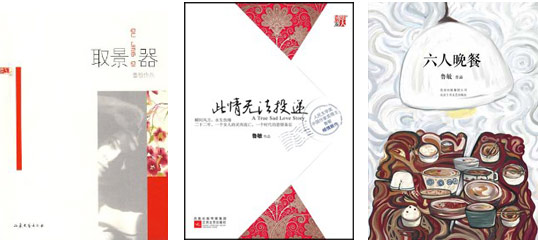
Viewfinder (2009) This short story collection includes many outstanding works such as "The Viewfinder," "No Evil Thoughts," and "The Gifts of the Deceased." As the jury statement of the 2007 Young Writers' Award stated: "'In The Viewfinder,' [...] [Lu] infuses the precise dramatic style with a languid, hard-to-describe complex set of experiences, exploring and presenting the structure, depth, and borders of the psychological world. In 'No Evil Thoughts,' [...] she confirms, with "tender kindness", the breadth of the human spirit, and the gravitas of human activity. [...] Between these two seemingly disjointed threads, Lu comes to an understanding of the vastness, the latitude of human nature."
Undeliverable Feelings (2010) A novel about "momentary love and lifelong pain." The year is 1987, and student Dan Qing meets Si Jia at a Christmas party. They develop an instant rapport both physically and spiritually; however, during the "Crackdown on Crime" campaign of the 1980s, Dan Qing is convicted of "hooliganism" and sentenced to death. Si Jia lives the rest of her life in the shadows, and Dan Qing's parents also become victims of the age. The novel recounts the 22 years spent by one woman in mental and physical exile.
Dinner for Six (2012) Lu Min's latest novel, described by the author as "the joys and sorrows of two single-parent families," tells the slapstick, carnivalesque story of six people suffering under the heavy shadow of the chemical industry and the great costs of materialistic advancement. As they seek to improve their circumstances, they are either limited by their congenital deficiencies or obsessed with illusory success; some hide under the sweet fragrance of unrequited love and go with the flow; some grow coarse and wither like wild grass; others forever struggle between private and public morality. These characters belong to the victimized middle/lower class, buried by the 'footsteps of progress.' The book is ultimately a feast in tribute of love and imperfection, honoring the majority who have failed in the dim twilight of lost time, 'success mania,' and increasingly cruel social stratification.

